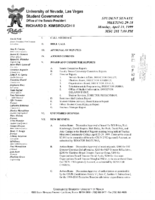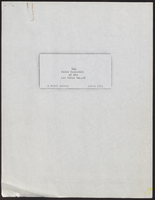Search the Special Collections and Archives Portal
Search Results
Harry Hayden Whiteley Architectural Records
Identifier
Abstract
The Harry Hayden Whiteley Architectural Records are comprised of architectural records (1931-1970) created and/or maintained by the American architect Harry Hayden Whiteley and/or his architectural firm, known as Harry Hayden Whiteley and Associates. This collection includes 30.21 linear feet of materials including 45 items from over 30 projects. The collection focuses on his work in the Las Vegas and Reno, Nevada areas. The materials feature both architectural drawings and project files. Architectural drawings include pencil and ink on tracing paper preliminary sketches and mounted artist’s renderings used for presentations and promotional materials. Project files include project correspondence, photographs, and structural calculations. The drawings also contain work from the architect Paul Revere Williams. The collection includes architectural drawings for hotels, shopping plazas, residential developments, and office buildings.
Archival Collection

Transcript of interview with Perle Garrett by Marilyn Swanson, March 2, 1975
Date
Archival Collection
Description
On March 2, 1975, Marilyn Swanson interviewed her neighbor Perle Garrett (born April 27, 1905 in Overbrook, Kansas) in her home in Boulder City, Nevada. This interview covers Boulder City during the 1930s, with special focus on the building of Boulder Dam. Mrs. Garrett relocated to Boulder City because her husband Theodore Garrett was one of the workers at the dam. She also discusses Six Companies houses, family life, the weather, churches in Las Vegas and recreational activities for local children. Her husband is also present during the interview.
Text

Meeting minutes for Consolidated Student Senate University of Nevada, Las Vegas, April 19, 1999
Date
Archival Collection
Description
Text

Sachiko Young oral history interview: transcript
Date
Archival Collection
Description
Oral history interview with Sachiko Young conducted by Mikaela Nettlow on December 5, 2021 for Reflections: The Las Vegas Asian American and Pacific Islander Oral History Project. Sachiko shares her upbringing in Fukoka, Japan and how she and her family moved frequently as a child. She talks about meeting her husband, an American military man, while visiting family in Tokyo. Sachiko discusses their marriage and birth of their child, their move to San Jose, California, and their travels back and forth from Japan before settling in Las Vegas, Nevada. She shares stories of visiting casinos with friends, working in hotel coffee shops, and what life was like for her and her family. Sachiko also talks of how she and her husband both faced racial prejudice from their families and the difficulties of learning English as a second language.
Text
Jon Ralston (Nevada Independent) oral history interview conducted by Kelliann Beavers and Kristian Thymianos: transcript
Date
Archival Collection
Description
From the Lincy Institute "Perspectives from the COVID-19 Pandemic" Oral History Project (MS-01178) -- Business interviews file.
Text
Ric Anderson (Las Vegas Sun) oral history interview conducted by Kelliann Beavers: transcript
Date
Archival Collection
Description
From the Lincy Institute "Perspectives from the COVID-19 Pandemic" Oral History Project (MS-01178) -- Business interviews file.
Text

Antioco Carrillo interview, 2019: transcript
Date
Archival Collection
Description
Interviewed by Monserrath Hernández, Rodrigo Vazquez, and Laurents Benitez-Bañuelos. A native of Jalisco, Mexico, moved to Las Vegas when he was about 20-year old in 1987. Attended CSN and UNLV. His history with Las Vegas is embedded in the 1980s Las Vegas gay scene and education for AIDS. He is and activist and the Executive Director of Aid for AIDS of Nevada. He and Theodore Small are the first same-sex marriage in Nevada.
Text

The water resources of the Las Vegas Valley: a brief survey, March 27, 1931
Date
Archival Collection
Description
Overview of the water resources in the Las Vegas Valley, includes maps
Text

Magdalena Martinez oral history interview: transcript
Date
Archival Collection
Description
Oral history interview with Magdalena Martinez conducted by Monserrath Hernandez and Barbara Tabach on April 4, 2019 for the Latinx Voices of Southern Nevada Oral History Project. In this interview, Magdalena Martinez recalls her childhood and growing up in Los Angeles, California. Martinez's parents are from Durango, Mexico, and immigrated to the United States in the 1970s. Martinez describes the generational differences that the women in her family faced and how the feminist movement of the 1970s did not resonate with women of color. Her family moved to Las Vegas in 1986 where she attended Bishop Gorman High School. After transferring to the University of Nevada, Las Vegas (UNLV) from community college and joining a student organization that would later become Student Organization of Latinxs, she became an early member of the Latino Youth Leadership Conference (LYLC) sponsored by the Latin Chamber of Commerce. Martinez describes how the LYLC has evolved over the years, and talks about her role in those changes. She discusses past work for CSN, NSHE, and currently is the Director of Education Programs with the Lincy Institute.
Text

Transcript of interview with Christie Young by Dennis McBride, October 18, 1998
Date
Archival Collection
Description
I've known Christie Young for many years and was grateful she agreed to be interviewed for the Las Vegas Gay Archives Oral History Project. Not only is she frank in what she says, but her background as a researcher in sexual issues and as a straight woman involved in the gay community give her a unique perspective. Ancillary to her donation of this interview transcript to the University of Nevada, Las Vegas, Christie has generously donated her personal journals which detail more than a decade of her life including the years she worked with Las Vegas's gay community . Christie shares the project's concern that documentation of the gay community is ephemeral and vanishes rapidly; her determination that her contribution to that community be preserved greatly enriches our knowledge and will benefit future scholars.
Text
